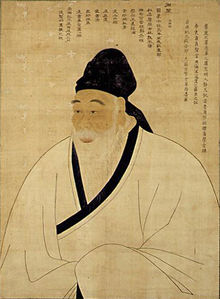Westerners 서인, 西人 | |
|---|---|
 Song Si-yeol, one of the most powerful and influential Westerners. His strife with his student Yun Jeung was one of the factors thar led to the Westerners dividing into the Soron and Noron. | |
| Seonjo era leaders | Jeong Cheol, Jo Heon, Seong Hon, Yi I |
| Injo era leaders | Choi Myung-kil, Kim Ja-jeom, Kim Ryu, Yi Gwi |
| Hyojong era leaders | Kim Jib, Song Si-yeol, Song Jun-gil |
| Hyeonjong era leaders | Song Si-yeol, Song Jun-gil, Kim Su-hong |
| Sukjong era leaders | Song Si-yeol, Kim Su-hang, Park Se-chae, Yun Jeung |
| Founder | Sim Ui-gyeom |
| Founded | 1575 |
| Dissolved | 1683 |
| Split from | Sarim |
| Preceded by | Sarim |
| Succeeded by | Norons, Sorons |
| Ideology | Philosophy of Yi I and Kim Jang-saeng |
| Religion | Neo-Confucianism |
| Westerners (Korean political faction) | |
| South Korean name | |
|---|---|
| Hangul | 서인 |
| Hanja | 西人 |
| Revised Romanization | Seoin |
| McCune–Reischauer | Sŏin |
The Westerners (Korean: 서인; Hanja: 西人; RR: Seoin; lit. West Person) was a political faction that dominated Korea in the 17th century. In 1575, the Sarim split into the Easterners and Westerners. The Westerners remained the main contender of the Easterners in the Seonjo age.
The Westerners lost power in the later years of the Seonjo age. The Easterners and the factions that split from the Easterners had power throughout the last decade of the Seonjo age and the entirety of the Gwanghaegun age. However, the Westerners ousted Gwanghaegun from power in 1623, making Prince Neungyang king and causing the Westerners to regain power, which they had lost for a generation.
The Westerners had power for half a century, from 1623 to 1674, in which they were relatively unified. The era also led to the appearance of powerful Westerner politicians such as Song Si-yeol, Song Jun-gil, and Kim Su-hang, of which Song Si-yeol was the most influential. the Yesong debate of the Hyeonjong era finally toppled the Westerner government, and a Southerner government ruled for six years, until 1680.
The Westerners regained power in 1680 with the Gyeongsin Hwanguk. However, there was a dispute between the younger Westerners and the older Westerners in 1682 on whether Kim Ik-hun, one of the figures who had brought down the Southerners in 1680, should be punished. The younger Westerners thought that Kim should be punished, while the older Westerners did not. When Song Si-yeol took the side of the older Westerners in 1683, the younger Westerners were infuriated at Song. Those who wanted Kim to be punished became known as the Soron (young learning), while those who continued to follow Song became the Noron (old learning). With the Hoeni Dispute in 1684 between the Noron scholar Song Si-yeol and the Soron scholar Yun Jeung, the Westerners were divided forever.